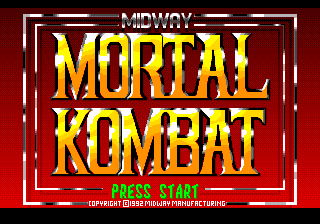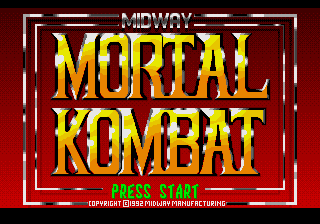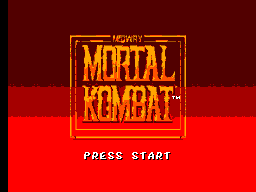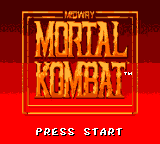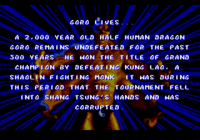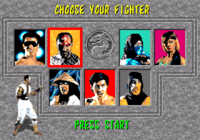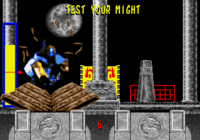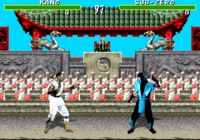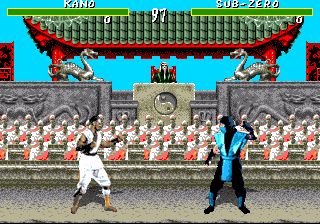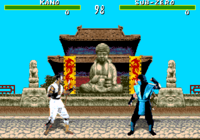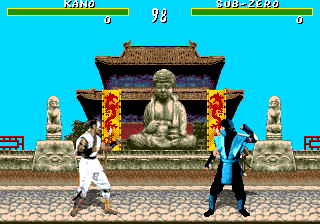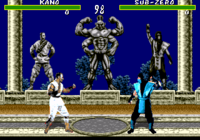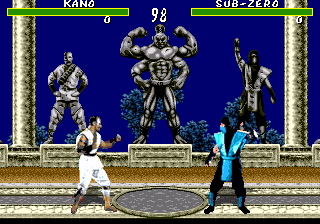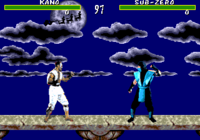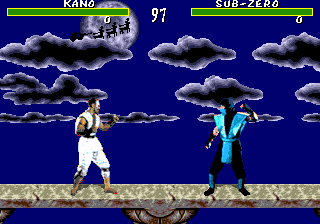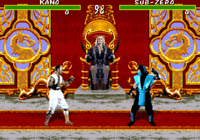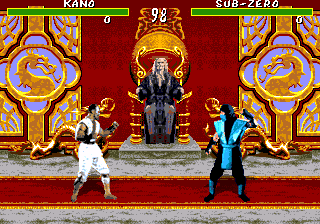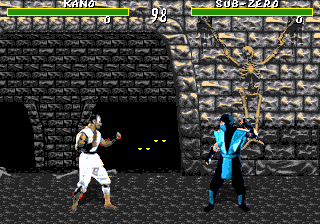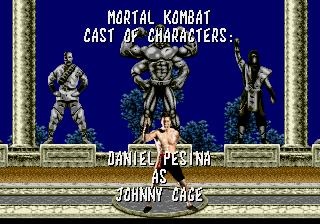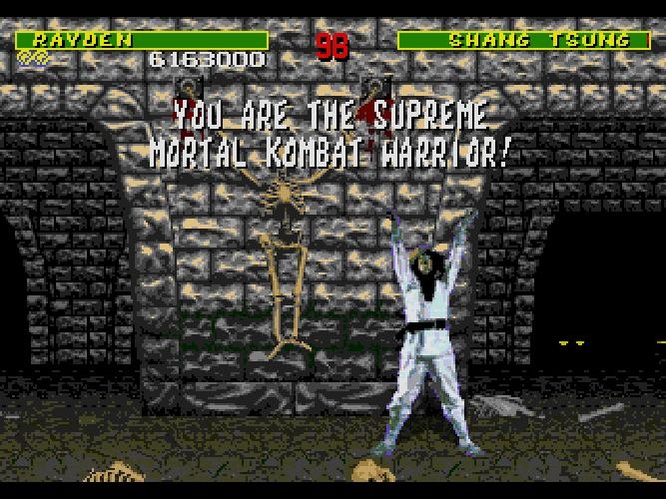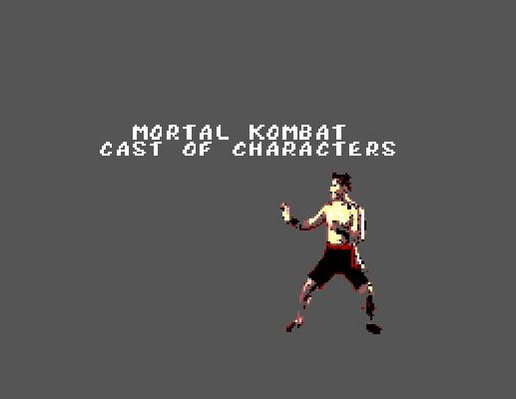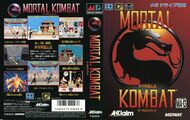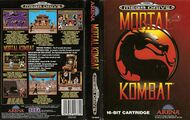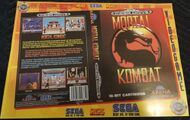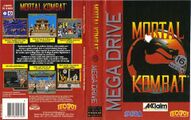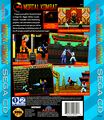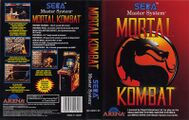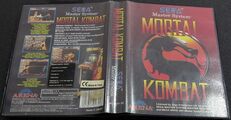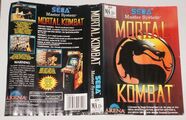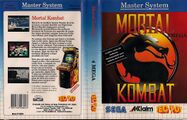Mortal Kombat
From Sega Retro
| Mortal Kombat | ||||||||||||||||||||||||||||||||||||||||||||||||||||||||||||||||||||||||||||||||||||||||||||||||||||||||||||||||||||||||||||||||||||||||||||
|---|---|---|---|---|---|---|---|---|---|---|---|---|---|---|---|---|---|---|---|---|---|---|---|---|---|---|---|---|---|---|---|---|---|---|---|---|---|---|---|---|---|---|---|---|---|---|---|---|---|---|---|---|---|---|---|---|---|---|---|---|---|---|---|---|---|---|---|---|---|---|---|---|---|---|---|---|---|---|---|---|---|---|---|---|---|---|---|---|---|---|---|---|---|---|---|---|---|---|---|---|---|---|---|---|---|---|---|---|---|---|---|---|---|---|---|---|---|---|---|---|---|---|---|---|---|---|---|---|---|---|---|---|---|---|---|---|---|---|---|---|
| System(s): Sega Mega Drive, Sega Mega-CD, Sega Master System, Sega Game Gear | ||||||||||||||||||||||||||||||||||||||||||||||||||||||||||||||||||||||||||||||||||||||||||||||||||||||||||||||||||||||||||||||||||||||||||||
| Publisher: Arena Entertainment (US/EU) Acclaim Japan (JP) | ||||||||||||||||||||||||||||||||||||||||||||||||||||||||||||||||||||||||||||||||||||||||||||||||||||||||||||||||||||||||||||||||||||||||||||
| Developer: Probe Software, Grey Team | ||||||||||||||||||||||||||||||||||||||||||||||||||||||||||||||||||||||||||||||||||||||||||||||||||||||||||||||||||||||||||||||||||||||||||||
| Licensor: Midway Manufacturing | ||||||||||||||||||||||||||||||||||||||||||||||||||||||||||||||||||||||||||||||||||||||||||||||||||||||||||||||||||||||||||||||||||||||||||||
| Original system(s): Arcade boards | ||||||||||||||||||||||||||||||||||||||||||||||||||||||||||||||||||||||||||||||||||||||||||||||||||||||||||||||||||||||||||||||||||||||||||||
| Sound driver: Krisalis sound driver | ||||||||||||||||||||||||||||||||||||||||||||||||||||||||||||||||||||||||||||||||||||||||||||||||||||||||||||||||||||||||||||||||||||||||||||
| Peripherals supported: Six Button Control Pad Gear-to-Gear Cable | ||||||||||||||||||||||||||||||||||||||||||||||||||||||||||||||||||||||||||||||||||||||||||||||||||||||||||||||||||||||||||||||||||||||||||||
| Genre: Action[1][2][3][4][5][6][7] | ||||||||||||||||||||||||||||||||||||||||||||||||||||||||||||||||||||||||||||||||||||||||||||||||||||||||||||||||||||||||||||||||||||||||||||
| Number of players: 1-2 | ||||||||||||||||||||||||||||||||||||||||||||||||||||||||||||||||||||||||||||||||||||||||||||||||||||||||||||||||||||||||||||||||||||||||||||
| ||||||||||||||||||||||||||||||||||||||||||||||||||||||||||||||||||||||||||||||||||||||||||||||||||||||||||||||||||||||||||||||||||||||||||||
|
Mortal Kombat (モータルコンバット), also known as Mortal Kombat Kanzen-ban (モータルコンバット完全版) on the Mega-CD in Japan, is a 1992 arcade fighting game by Midway Manufacturing. At the time, it was considered revolutionary for its use of digitized graphics, though it was also met with controversy thanks to its high levels of violence.
Following its release in the arcades, home versions were created and released in September 1993 on a date which became known as "Mortal Monday". This date saw Sega Mega Drive, Sega Master System, and Sega Game Gear versions of the game (among versions for other systems), published by Arena Entertainment simultaneously in North America and Europe, although Japan and Brazil were forced to wait some months later. A Sega Mega-CD version did not arrive until 1994.
Contents
Story
The game takes place in Earthrealm, where a tournament is being held on Shang Tsung's Island. Shang Tsung was banished to Earthrealm 500 years previously and, with the help of the monstrous Goro, is able to seize control of the Mortal Kombat tournament in an attempt to doom the realm. For 500 years straight, Goro has been undefeated in the tournament and won nine consecutive tournaments. If Goro wins again, Shao Kahn, Emperor of Outworld, will be allowed to take Earthrealm. In order to prevent this, a new generation of warriors must challenge Goro.
Gameplay
Mortal Kombat is a fighting game in which players battle opponents in one-on-one matches. The fighter that drains the opponent's health bar first wins the round, and the first to win two rounds wins the match. Each round is timed; if both fighters still have health remaining when time runs out, the one with more health wins the round. At the end of the final round, the losing character is dazed, and the winning fighter has a short amount of time to perform a Fatality, a finishing move performed against a defeated opponent to execute them in a gruesome fashion. Two players can start a game together, or a second player can join in during a single player's game by pressing START to fight against them. If a game was in progress at the time, the winner continues it alone; if not, the winner begins a new game.
In the single-player game, the player faces each of the seven playable characters in a series of one-on-one matches against computer-controlled opponents, ending in a "Mirror Match" against a duplicate of the player's chosen character and then three endurance matches against two opponents. As soon as the player defeats the first opponent, the second one enters the arena and the timer resets, but the player's health meter does not regenerate. After the third endurance match, the player fights the sub-boss Goro, followed by a final match against Shang Tsung.
Between certain levels, players can compete in a mini-game called "Test Your Might" for bonus points, breaking blocks of various materials by filling a meter past a certain point through rapid button presses. The first material the player must break is wood, followed by stone, steel, ruby, and finally diamond, with each successive material requiring more of the meter to be filled up and thus awarding more points. Two players can compete in the mini-game at once; the last two materials are only accessible through two-player mode.
Characters move with ![]() and
and ![]() and crouch with
and crouch with ![]() . They jump with
. They jump with ![]() and flip back and forth with
and flip back and forth with ![]() and
and ![]() . All characters have punches and kicks that can either be aimed high or low. Characters perform a low punch with
. All characters have punches and kicks that can either be aimed high or low. Characters perform a low punch with ![]() , a high punch with
, a high punch with ![]() , a low kick with
, a low kick with ![]() , and a high kick with
, and a high kick with ![]() . Characters block by holding
. Characters block by holding ![]() or
or ![]() . Blocking can be done while standing or crouching.
. Blocking can be done while standing or crouching.
When using a standard three-button control pad, characters perform a low punch with ![]() , a high punch with
, a high punch with ![]() +
+![]() or
or ![]() +
+![]() , a low kick with
, a low kick with ![]() , and a high kick with
, and a high kick with ![]() , and START blocks.
, and START blocks.
In the 8-bit versions, characters punch with ![]() and kick with
and kick with ![]() . Block is assigned to START in the Game Gear version and
. Block is assigned to START in the Game Gear version and ![]() +
+![]() in the Master System version.
in the Master System version.
All characters have a shared set of attacks performed by holding the D-Pad in various directions, such as the roundhouse kick, leg sweep, and uppercut. Uppercuts knock the enemy high into the air and cause a large amount of damage. The game introduced the concept of "juggling," knocking an opponent into the air and following up with a combination of attacks while the enemy is still airborne and defenseless. Normal moves are mostly the same between characters, with variations in range and speed, but characters differ in their special moves. Most special moves are performed by moving the D-Pad in certain directions, usually ending with an attack button. Unlike most one-on-one fighting games, few moves involve semicircular directional motions. The game's blocking system also distinguished itself from other fighting games, as it uses a dedicated block button, and characters take a small amount of damage from regular moves while blocking. However, the dedicated block button allows characters to defend against attacks without retreating, so blocking characters lose very little ground when struck, making counterattacks much easier after a successful block.
The Mega Drive and Mega-CD versions have five difficulty settings for computer-controlled opponents (Very Easy, Easy, Medium, Hard, and Very Hard) and allow the player to change the number of starting credits in the options. The Master System and Game Gear versions have three difficulty settings (Easy, Medium, and Hard) and no other options. With the exception of the Mega-CD version, violent finishing moves are censored and blood is disabled by default. By entering a special code, blood is enabled and some finishing moves are more graphic.
Characters
Move lists assume the player is facing right. If facing left, ![]() and
and ![]() should be reversed.
should be reversed.
All characters can perform roundhouse kicks with ![]() + HK (which knock the opponent away), leg sweeps with
+ HK (which knock the opponent away), leg sweeps with ![]() + LK (which cause the opponent to fall down), and uppercuts with
+ LK (which cause the opponent to fall down), and uppercuts with ![]() + LP or
+ LP or ![]() + HP (which knock the opponent high into the air). Throws are performed by pressing HK when next to the opponent.
+ HP (which knock the opponent high into the air). Throws are performed by pressing HK when next to the opponent.
When using a standard three-button control pad on the Mega Drive version, the LP button can generally substitute for either LP or HP when performing special moves.
Fatalities often require being a certain distance from the opponent in order to execute. All finishing moves can be performed while holding the BL button, which is sometimes useful to avoid accidentally moving or hitting the opponent before the button combination is fully pressed. The Pit stage has a unique stage-specific Fatality, performed by simply finishing with an uppercut. The "blood code" must be entered to see the Fatalities as described.
Kano was omitted from the 8-bit versions.
Playable
Bosses
| Goro | |
|---|---|
| A 2,000-year-old half-human, half-dragon with four arms and a massive stature. He has been the undefeated champion of the Mortal Kombat Tournament for 500 years. He is the game's penultimate boss. | |
| Shang Tsung | |
| An evil sorcerer who steals the souls of his opponents. He can shapeshift into the form of any other fighter. He has hosted the tournament for 500 years, and he is the game's final boss. |
Hidden
Reptile was omitted from the 8-bit versions.
- Main article: Mortal Kombat/Hidden content.
| Reptile | |
|---|---|
| A green ninja who has the movesets of Scorpion and Sub-Zero. Reptile can be fought if the player gets double flawless victories, never blocks, and finishes with a Fatality against the computer when certain objects are seen in the Pit stage. |
Stages
- Main article: Mortal Kombat/Comparisons.
The stages are played in order (and loop around after the last one). The Goro's Lair stage is always used for the boss fights with Goro and Shang Tsung.
The Pit stage has a stage-specific Fatality where the opponent is uppercutted into a bed of spikes at the bottom of the pit. If found, Reptile is fought at the bottom of the Pit.
History
Release
Sega's success with the Mega Drive version of the game prompted Nintendo to change their somewhat strict policies put forward in the late 1980s, and the Super NES version of the sequel, Mortal Kombat II, features red blood. Sega's Videogame Rating Council was also criticised for rating the Mega Drive version of the game a MA-13, implying that the game's content in its non-censored state was suitable for 13-year-olds. Mortal Kombat and other games such as Night Trap would inspire the creation of the ESRB, which would cover all game consoles in North America and remains in place to this day.
The release of the game caused big controversy in Germany. Initially, all versions of the game went on sale in Germany due to the fact that they were censored. USK detected that the Sega version of the game have a code to unlock the blood so it was decided to withdraw all copies of the game from Germany and banning the game. In 2005, the game disappeared from the list of banned games.
Legacy
Mortal Kombat was followed by Mortal Kombat II in the following year, and continues to see sequels to this day.
Versions
Mega Drive version
The Mega Drive version was a mini-success story for Sega. This is because the Super Nintendo version, at the time in direct competition with Sega's console, opted for strict censorship, removing blood, toning down fatalities and creating a far less "violent" product. The Mega Drive version was considerably more faithful to the arcade original, and was the preferred choice at the time by consumers.
The music was also rearranged by Matt Furniss, this arrangement being unique to this port.
Mega-CD version
The Mega-CD version was rated MA-17 in North America and was therefore subject to less criticism. In fact, there is actually a code to turn the gore down in the Mega-CD port: ![]()
![]()
![]()
![]()
![]()
![]()
![]() .
.
As well as a CD audio soundtrack (which is essentially a recording of the arcade version), the game contains a grainy version of the famous "Mortal Monday" TV commercial. Some tracks play in the wrong stages, though there are some bonus remixes that can be heard if the game is played on a regular CD player.
The Mega-CD version is otherwise identical to the Mega Drive version, though load times can mean that Shang Tsung is open to attack while transforming. Curiously, this version uses fighting music track from Amiga port when fighting Shang Tsung.
Master System and Game Gear versions
Predictably the Master System version is toned down for the weaker hardware, and is censored until a cheat code is inputted. Kano and Reptile have been omitted from this version, presumably to save space. It includes only Goro's Lair and The Pit stages, the latter having stage fatality removed. The music is based on Allister Brimble's arrangement, the arrangement shared with PC floppy and Game Boy ports. Like all Master System games after 1991, this version was not released in North America.
The Game Gear version is almost identical to the Master System port, except for the smaller screen size.
Production credits
Mega Drive version
- Daniel Pesina as Johnny Cage
- Richard Divizio as Kano
- Carlos Pesina as Rayden
- Ho Sung Pak as Liu Kang
- Daniel Pesina as Scorpion
- Daniel Pesina as Sub-Zero
- Elizabeth Malecki as Sonya
- Goro Character Design: John Tobias
- Stop Motion Miniature: Curt Chiarelli
- Ho Sung Pak as Shang Tsung
- Software: Paul Carruthers
- Additional Software: Richard Costello
- Graphics: Lee Ames
- Producer: Gary Liddon
- Music and Sound: Matt Furniss, Shaun Hollingworth
- Testing: James, Simon, Barg and Tim
- Special Thanks to: Dave Spangle
- Producer: Rob Leingang
- Associate Producer: Stacy Hendrickson
- Analysts: Tyrone Miller, Joe Libertella, Tom Rademacher, Jim MK Fink
- Special Thanks to: Eric, Alex and Tony, Ed and John at Williams
Mega-CD version
- Daniel Pesina as Johnny Cage
- Richard Divizio as Kano
- Carlos Pesina as Rayden
- Ho Sung Pak as Liu Kang
- Daniel Pesina as Scorpion
- Daniel Pesina as Sub-Zero
- Elizabeth Malecki as Sonya
- Goro Character Design: John Tobias
- Stop Motion Miniature: Curt Chiarelli
- Ho Sung Pak as Shang Tsung
- Design and Software: Ed Boon
- Design and Graphics: John Tobias
- Music and Sounds: Dan Forden
- Background Graphics: John Vogel
- Software: Paul Carruthers
- Graphics: Lee Ames
- Producer: Adrian Curry
- Sound Effects: Andy Brock
- QA Technicians: Tim Bradstock, Simon Bland, James Stewart, Ashley Fawkes
- QA Manager: Barg
- Special Thanks to: Greg Michael, Bob Armour, Richard Costello, Gary Liddon, Dave Dootson, Dave Spangle, Rusty Chestnut, Dr Helmutt Moss, Mr Fish
- Producer: Rob Leingang
- Associate Producer: Stacy Hendrickson
- Analysts: Alex DeLucia, Joe Libertella, James Johnson
- Special Thanks to: Eric Samulski, Wang Lee, -
Master System and Game Gear versions
- Daniel Pesina as Johnny Cage
- Carlos Pesina as Rayden
- Ho Sung Pak as Liu Kang
- Daniel Pesina as Scorpion
- Daniel Pesina as Sub Zero
- Elizabeth Malecki as Sonya
- Goro Character Design by: John Tobias
- Stop Motion Miniature by: Curt Chiarelli
- Ho Sung Pak as Shang Tsung
- Programming by: Keith Burkhill
- Backgrounds by: Lee Ames
- Other Graphics by: Keith Burkhill
- Music by: Allister Brimble
- Produced by: Gary Liddon
- Quality Assurance by the Probe Quality Assurance Department Who Are: Simon Bland, Barg, James Stewart, Tim Bradstock
- Producer: Rob Leingang
- Associate Producer: Stacy Hendrickson
- Analysts: Tyrone Miller, Joe Libertella, Tom Rademacher, Jim MK Fink
- Special Thanks to: Eric
Magazine articles
- Main article: Mortal Kombat/Magazine articles.
Promotional material
- Main article: Mortal Kombat/Promotional material.
Physical scans
Mega Drive version
| Sega Retro Average | |||||||||||||||||||||||||||||||||||||||||||||||||||||||||||||||||||||||||||||||||||||||||||||||||||||||||||||||||||||||||||||||||||||||||||||||||||||||||||||||||||||||||||||||||||||||||||||||||||||||||||||||||||||||||||||||||||||||||||||||
|---|---|---|---|---|---|---|---|---|---|---|---|---|---|---|---|---|---|---|---|---|---|---|---|---|---|---|---|---|---|---|---|---|---|---|---|---|---|---|---|---|---|---|---|---|---|---|---|---|---|---|---|---|---|---|---|---|---|---|---|---|---|---|---|---|---|---|---|---|---|---|---|---|---|---|---|---|---|---|---|---|---|---|---|---|---|---|---|---|---|---|---|---|---|---|---|---|---|---|---|---|---|---|---|---|---|---|---|---|---|---|---|---|---|---|---|---|---|---|---|---|---|---|---|---|---|---|---|---|---|---|---|---|---|---|---|---|---|---|---|---|---|---|---|---|---|---|---|---|---|---|---|---|---|---|---|---|---|---|---|---|---|---|---|---|---|---|---|---|---|---|---|---|---|---|---|---|---|---|---|---|---|---|---|---|---|---|---|---|---|---|---|---|---|---|---|---|---|---|---|---|---|---|---|---|---|---|---|---|---|---|---|---|---|---|---|---|---|---|---|---|---|---|---|---|---|---|---|---|---|---|---|---|---|---|---|---|---|---|---|
|
| 83 | |
|---|---|
| Based on 47 reviews | |
Mega-CD version
| Sega Retro Average | ||||||||||||||||||||||||||||||||||||||||||||||||||||||||||||||||||||||||||||||||||||||||||||||||||||||||||||||||||||||||||||
|---|---|---|---|---|---|---|---|---|---|---|---|---|---|---|---|---|---|---|---|---|---|---|---|---|---|---|---|---|---|---|---|---|---|---|---|---|---|---|---|---|---|---|---|---|---|---|---|---|---|---|---|---|---|---|---|---|---|---|---|---|---|---|---|---|---|---|---|---|---|---|---|---|---|---|---|---|---|---|---|---|---|---|---|---|---|---|---|---|---|---|---|---|---|---|---|---|---|---|---|---|---|---|---|---|---|---|---|---|---|---|---|---|---|---|---|---|---|---|---|---|---|---|---|---|
|
| 74 | |
|---|---|
| Based on 24 reviews | |
| Mega-CD, PT |
|---|
|
Master System version
| Sega Retro Average | ||||
|---|---|---|---|---|
|
| N/A | |
|---|---|
| Based on 0 reviews | |
Game Gear version
| Sega Retro Average | ||||
|---|---|---|---|---|
|
| N/A | |
|---|---|
| Based on 0 reviews | |
| Game Gear, PT |
|---|
|
Technical information
- Main article: Mortal Kombat/Technical information.
References
- ↑ File:MK MD JP Box.jpg
- ↑ 2.0 2.1 https://sega.jp/history/hard/megadrive/software_l.html (Wayback Machine: 2020-07-02 23:21)
- ↑ File:MK GG EU Box Back.jpg
- ↑ File:MK GG JP Box Front.jpg
- ↑ 5.0 5.1 http://sega.jp/fb/segahard/gg/soft_licensee.html (Wayback Machine: 2013-01-01 20:24)
- ↑ File:MK MCD JP Box Back.jpg
- ↑ 7.0 7.1 https://sega.jp/fb/segahard/mcd/soft_licensee.html (Wayback Machine: 2019-06-10 17:56)
- ↑ 8.0 8.1 Beep! MegaDrive, "June 1994" (JP; 1994-05-07), page 11
- ↑ 9.0 9.1 GamePro, "September 1993" (US; 1993-xx-xx), page 7
- ↑ 10.0 10.1 10.2 10.3 Computer & Video Games, "August 1993" (UK; 1993-07-15), page 48
- ↑ Mega, "October 1993" (UK; 1993-09-16), page 47
- ↑ 12.0 12.1 MAN!AC, "11/93" (DE; 1993-xx-xx), page 58
- ↑ 13.0 13.1 Jogos Vídeo, "Dezembro de 1993; Ano 1, Nº 2'"`UNIQ--ref-0000000C-QINU`"'" (PT; 1993-12-xx), page 27
- ↑ 14.0 14.1 Sega Pro, "October 1993" (UK; 1993-09-09), page 34
- ↑ MAN!AC, "11/93" (DE; 1993-xx-xx), page 79
- ↑ Sega Force Mega, "January 1994" (UK; 1993-12-16), page 59
- ↑ Electronic Gaming Monthly, "May 1994" (US; 1994-xx-xx), page 177
- ↑ 18.0 18.1 18.2 Mean Machines Sega, "June 1994" (UK; 1994-04-30), page 74
- ↑ 19.0 19.1 Sega Power, "July 1994" (UK; 1994-05-05), page 44
- ↑ Sega Pro, "July 1994" (UK; 1994-06-16), page 47
- ↑ File:Mortal Kombat MD credits.pdf
- ↑ File:MortalKombat MCD JP SSEnding.pdf
- ↑ File:Mortal Kombat SMS credits.pdf
- ↑ 1700 igr dlya Sega, "" (RU; 2001-xx-xx), page 134
- ↑ Aktueller Software Markt, "November 1993" (DE; 1993-10-11), page 38
- ↑ Beep! MegaDrive, "July 1994" (JP; 1994-06-08), page 16
- ↑ Consoles +, "Septembre 1993" (FR; 1993-0x-xx), page 18
- ↑ Cool Gamer, "9" (RU; 2002-10-13), page 128
- ↑ Electronic Games (1992-1995), "September 1993" (US; 1993-08-24), page 59
- ↑ Electronic Gaming Monthly, "September 1993" (US; 1993-xx-xx), page 34
- ↑ Entsiklopediya luchshikh igr Sega. Vypusk 1, "" (RU; 1999-xx-xx), page 333
- ↑ Entsiklopediya luchshikh igr Sega. Vypusk 10, "" (RU; 2003-10-08), page 83
- ↑ Mean Machines: The Essential Sega Guide, "" (UK; 1993-11-18), page 73
- ↑ Famitsu, "1994-06-03" (JP; 1994-05-20), page 1
- ↑ GameFan, "Volume 1, Issue 10: September 1993" (US; 1993-xx-xx), page 14
- ↑ Game Power, "Ottobre 1993" (IT; 1993-xx-xx), page 56
- ↑ GamePro, "September 1993" (US; 1993-xx-xx), page 58
- ↑ Gamers, "August/September 1993" (DE; 1993-07-23), page 46
- ↑ GamesMaster (UK) "Series 3, episode 1" (1993-09-09, 24:00) (+9:15)
- ↑ Game Informer, "September/October 1993" (US; 1993-0x-xx), page 36
- ↑ Hippon Super, "June 1994" (JP; 1994-04-30), page 62
- ↑ Hobby Consolas, "Septiembre 1993" (ES; 1993-xx-xx), page 36
- ↑ Hyper, "December 1993" (AU; 1993-xx-xx), page 32
- ↑ Joker, "Januar 1994" (SI; 1994-xx-xx), page 19
- ↑ Joypad, "Septembre 1993" (FR; 1993-0x-xx), page 38
- ↑ Mega, "October 1993" (UK; 1993-09-16), page 46
- ↑ Mega Action, "October 1993" (UK; 1993-09-09), page 18
- ↑ Megablast, "4/93" (DE; 1993-09-29), page 38
- ↑ Mega Force, "Septembre 1993" (FR; 1993-0x-xx), page 82
- ↑ Mega Fun, "10/93" (DE; 1993-09-22), page 30
- ↑ Mega Power, "September 1993" (UK; 1993-08-19), page 60
- ↑ MegaTech, "September 1993" (UK; 1993-08-20), page 76
- ↑ Micromanía (segunda época), "Septiembre 1993" (ES; 1993-0x-xx), page 44
- ↑ Mean Machines Sega, "September 1993" (UK; 1993-07-30), page 70
- ↑ Player One, "Septembre 1993" (FR; 1993-08-xx), page 75
- ↑ Power Up!, "Friday, September 17, 1993" (UK; 1993-09-17), page 1
- ↑ Power Play, "11/93" (DE; 1993-10-13), page 136
- ↑ Sega Magazin, "November/Dezember 1993" (DE; 1993-11-03), page 24
- ↑ Sega Power, "November 1993" (UK; 1993-10-07), page 66
- ↑ Sega Pro, "September 1993" (UK; 1993-08-12), page 36
- ↑ Sega Zone, "October 1993" (UK; 1993-09-xx), page 20
- ↑ Sega Force Mega, "September 1993" (UK; 1993-07-22), page 10
- ↑ Sega Mega Drive Review, "1" (RU; 1995-04-03), page 99
- ↑ Sega Saturn Magazine, "September 1995" (JP; 1995-08-08), page 87
- ↑ Todo Sega, "Octubre 1993" (ES; 1993-xx-xx), page 32
- ↑ Tricks 16 bit, "Tricks Sega Gold 800 igr" (RU; 1998-03-20), page 116
- ↑ Video Games, "11/93" (DE; 1993-10-27), page 110
- ↑ VideoGames, "October 1993" (US; 1993-xx-xx), page 40
- ↑ GamesMaster, "May 1994" (UK; 1994-04-28), page 66
- ↑ Beep! MegaDrive, "July 1994" (JP; 1994-06-08), page 19
- ↑ Consoles +, "Juin 1994" (FR; 1994-0x-xx), page 148
- ↑ Digitiser (UK) (1994-06-15)
- ↑ Electronic Games (1992-1995), "October 1994" (US; 1994-xx-xx), page 110
- ↑ Electronic Gaming Monthly, "June 1994" (US; 1994-xx-xx), page 34
- ↑ Famitsu, "1994-06-03" (JP; 1994-05-20), page 39
- ↑ FLUX, "Issue #1" (US; 1994-xx-xx), page 78
- ↑ Game Players, "Vol. 7 No. 5 May 1994" (US; 1994-0x-xx), page 36
- ↑ GamePro, "July 1994" (US; 1994-xx-xx), page 64
- ↑ Hobby Consolas, "Junio 1994" (ES; 1994-xx-xx), page 74
- ↑ Joypad, "Juin 1994" (FR; 1994-0x-xx), page 114
- ↑ MAN!AC, "07/94" (DE; 1994-06-08), page 64
- ↑ Mega, "July 1994" (UK; 1994-06-16), page 46
- ↑ MegaTech, "July 1994" (UK; 1994-06-16), page 60
- ↑ Player One, "Juin 1994" (FR; 1994-0x-xx), page 96
- ↑ Sega Magazine, "July 1994" (UK; 1994-06-16), page 92
- ↑ Sega Pro, "July 1994" (UK; 1994-06-16), page 46
- ↑ Sega Zone, "July 1994" (UK; 1994-06-xx), page 28
- ↑ Sega Saturn Magazine, "September 1995" (JP; 1995-08-08), page 85
- ↑ Todo Sega, "Julio 1994" (ES; 1994-0x-xx), page 42
- ↑ Video Games, "7/94" (DE; 1994-06-29), page 80
- ↑ VideoGames, "June 1994" (US; 1994-0x-xx), page 72
| Mortal Kombat | |
|---|---|
|
Main page | Comparisons | Hidden content | Magazine articles | Video coverage | Reception | Promotional material | Region coding | Technical information | Bootlegs
Prototypes: Prototype B
| |
| Mortal Kombat games for Sega systems | |
|---|---|
| Mortal Kombat (?) | Mortal Kombat II (?) | Mortal Kombat 3 (1995) | Ultimate Mortal Kombat 3 (1996) | |
| Mortal Kombat (1993) | Mortal Kombat II (1994) | Mortal Kombat 3 (1996) | |
| Mortal Kombat (?) | |
| Mortal Kombat II (?) | |
| Mortal Kombat II (?) | Mortal Kombat 3 (unreleased) | Ultimate Mortal Kombat 3 (1996) | Mortal Kombat Trilogy (1997) | |
| Mortal Kombat Gold (1999) | |
| Unlicensed Mortal Kombat games for Sega systems | |
| Mortal Kombat 5 (1999) | |
- Six Button Control Pad-compatible games
- Gear-to-Gear Cable-compatible games
- 1-2 player games
- JP Mega Drive games
- All JP games
- US Mega Drive games
- All US games
- EU Mega Drive games
- All EU games
- DE Mega Drive games
- All DE games
- PT Mega Drive games
- All PT games
- UK Mega Drive games
- All UK games
- SE Mega Drive games
- All SE games
- AU Mega Drive games
- All AU games
- BR Mega Drive games
- All BR games
- Mega Drive games
- 1993 Mega Drive games
- All 1993 games
- Mega Drive action games
- All action games
- EU Master System games
- DE Master System games
- PT Master System games
- UK Master System games
- AU Master System games
- BR Master System games
- Master System games
- 1993 Master System games
- Master System action games
- JP Game Gear games
- US Game Gear games
- EU Game Gear games
- PT Game Gear games
- UK Game Gear games
- Game Gear games
- 1993 Game Gear games
- Game Gear action games
- JP Mega-CD games
- US Mega-CD games
- EU Mega-CD games
- PT Mega-CD games
- UK Mega-CD games
- AU Mega-CD games
- BR Mega-CD games
- Mega-CD games
- 1994 Mega-CD games
- All 1994 games
- Mega-CD action games
- All games
- Pages with broken file links
- Old-style rating (gameplayers)
- Rating without source
- Old-style rating (gamesmaster)
- Rating without PDF source
- Old-style rating (mdag)
- Old-style rating (t2)
- Update ratings template
- 4 old ratings
- Old-style rating (megaplay)
- 1 old ratings
- Old-style rating (consolesplus)
- 2 old ratings
- No ratings
- Old-style rating (pu)
- Mortal Kombat
- Mortal Kombat (franchise)
- Sega Channel games
